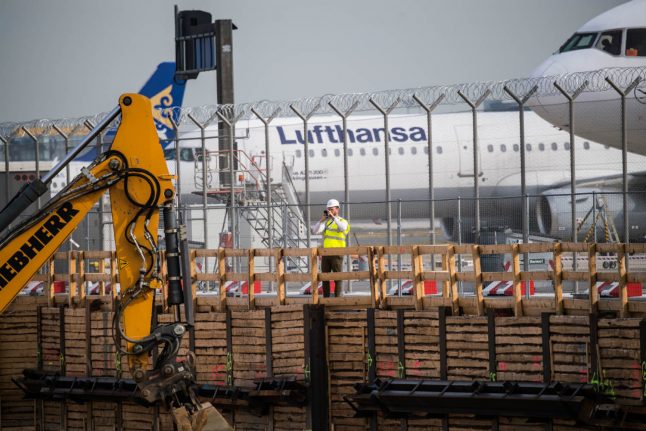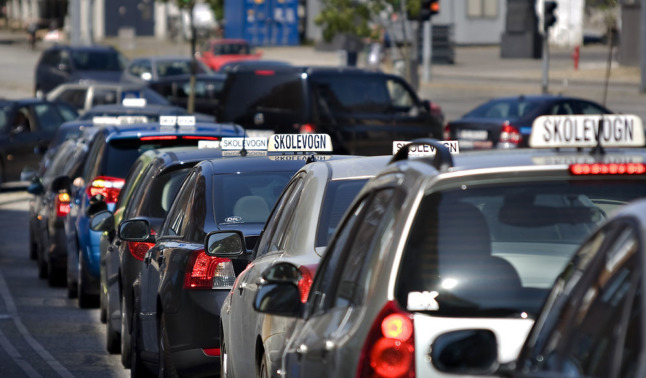“It’s like living in a cage, in the summer time you can’t go outside the house,” says Petra Schmidt, who has lived her whole life in the town of Walldorf just south of Frankfurt Airport. “You have to live with a constant background noise.”
Life for Schmidt and her neighbours has been made steadily less pleasant as the airport has grown in recent decades. As Frankfurt’s importance as a global business hub has grown, the airport has also expanded to swallow up ever more of the surrounding forests. Since the 1980s two new runways have been built, as well as expansions to the autobahn.
Now though, things are set to get an awful lot more uncomfortable for local residents.
On Monday construction started on a third terminal. When the project is completed in 2023 it will bring passengers numbers up to over 90 million, establishing Frankfurt Airport above Heathrow as the biggest air hub on the continent.
SEE ALSO: The long trading history that turned Frankfurt into an economic powerhouse
New terminal, new jobs
The state of Hesse sees Terminal 3 as vital to securing Frankfurt’s future as the place to do business in Europe.
“Today we aren’t just laying the cornerstone for a new airport building. We are also establishing the basis for more jobs, more opportunities, and greater economic vitality,” state finance minister Thomas Schäfer said at Monday’s opening ceremony.
The speed and efficiency with which the project has been brought to fruition can only be marvelled at by business communities in London and Berlin, where new air infrastructure have run aground, either on the back of local protest or on the incompetence of construction firms.
Planning for Frankfurt's Terminal 3 was granted in 2014 and the first stage of the project is set for completion in 2021.
 The plan for the Terminal. Image: DPA
The plan for the Terminal. Image: DPA
For proponents, the swiftness of the expansion underlines the region’s optimistic, pro-business outlook. From this point of view, Terminal 3 is the logical next stage in a growth strategy that has helped Frankfurt become a base for more foreign banks than New York.
One only need look at the job statistics to see the benefit for the local economy. Much of Hesse recorded full employment last year based on strong economic growth.
Frankfurt has also been one of the big winners with Brexit looming, as businesses relocate to 'Mainhattan' from London or the rest of the UK.
SEE ALSO: The world's smallest global city: How Frankfurt is selling itself to Brexit bankers
The not so green Green
For Hesse, the airport is a cash cow. It is the biggest employer in the region and the holding company Fraport has an annual revenue of €3.5 billion. As the biggest shareholder, the state government can count on the airport to fill its coffers for spending on social projects and infrastructure.
But the expansion has also happened over the heads of local communities, who have organized dozens of citizen’s groups. On Monday, while politicians patted one another on the back at the opening ceremony, locals laid a gravestone at the airport to symbolize the death of their hopes that the project could be prevented.
Locals are particularly disappointed at the fact that the expansion is going ahead while the Green party are the junior partner in the state government (along with the Christian Democratic Union).
The environmentalist party are known for their opposition to the airline industry which they believe to put undue strain on the climate.
Green party leader in Hesse, Tarek al-Wazir, campaigned against the new Terminal when he was in opposition, but has gone silent ever since he entered government five years ago.
Al-Wazir has claimed the project was too far developed for him to stop, something he apparently failed to realize until he entered government.
 A protest against the airport expansion. Photo: DPA
A protest against the airport expansion. Photo: DPA
“He really didn’t do anything to try and prevent the project from happening,” local resident Schmidt says. “He visited us recently and made clear that he supports the airport growth because it is good for economic growth.
“I can’t really see how he is different from an SPD politician.”
Still, Al-Wazir, who kept his distance from Monday’s opening ceremony, has assured locals the expansion will be accompanied by anti-sound pollution measures. Several million euros will go towards insulating affected residents’ homes against the additional noise.
But Schmidt complains that these steps are inadequate
“The protections are only for people’s bedrooms. But what about when they want to spend time in the garden in the summer at a time when air traffic is particularly heavy?” she asks.
As for Frankfurt’s mission to become a global finance hub, Schmidt is sceptical about its benefits for ordinary people. “You see all these luxury apartments being built in the city. But they are symptomatic of a growing divide between the haves and have nots – and the new Terminal will just cement this division,” she says.
As for the Green party, she has lost hope that they can be a partner in her fight against air traffic.
“We need to join up with other civil movements. Friday for Future [the youth anti-climate change movement] have shown the way to go, we need to join them,” she says.



 Please whitelist us to continue reading.
Please whitelist us to continue reading.
Member comments